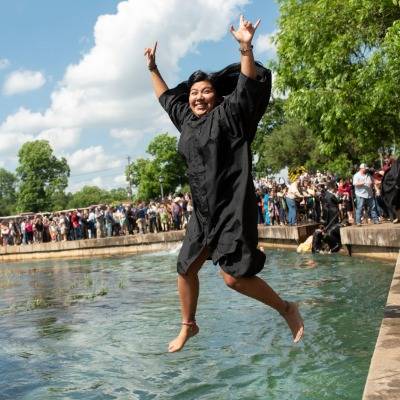Master's Program in Developmental Education
The Master’s Program in Developmental Education within the Department of Curriculum and Instruction prepares future educators, leaders, program developers, and administrators to enhance the learning and educational experiences of post-secondary students in a variety of contexts. The department is committed to offering a robust experience in which students learn to think critically about theory, research, and practice in multiple areas of college readiness and developmental education including developmental literacy, learning support, and developmental mathematics. As a multidisciplinary program, the faculty, staff, and students work collaboratively across various academic disciplines, diverse communities, and geographic boundaries.
-
Welcome
 Welcome to the official website of the Master’s Program in Developmental Education (DE). We appreciate your interest in our program and the field of developmental education. Our Graduate Program in Developmental Education offers M.A., Ed.D., and Ph.D. degrees in developmental education. We also offer a graduate minor. This website is specific to our master’s program and graduate minor.
Welcome to the official website of the Master’s Program in Developmental Education (DE). We appreciate your interest in our program and the field of developmental education. Our Graduate Program in Developmental Education offers M.A., Ed.D., and Ph.D. degrees in developmental education. We also offer a graduate minor. This website is specific to our master’s program and graduate minor. Our website contains detailed information for current and prospective students. As you explore our degree plans, graduate minors, and funding opportunities, we also hope you will become more familiar with our community of graduate students, staff, and faculty, and the research and educational initiatives in which we are involved.
Should you have any questions or need more information, please do not hesitate to contact me directly.
Sincerely,
Taylor W. Acee, Ph.D.
Associate Professor and Master’s Program Coordinator
Email: ta19@txstate.edu
Office phone: 512-245-7903
-
What is Developmental Education
Developmental Education is a field of research, policy, and practice focused on student success at the postsecondary level. Attuned especially to those students who struggle, due to a variety of factors, in their first year (and beyond) of a 2- or 4-year college, the field seeks to understand the reasons for those struggles, support those students who struggle, and define the role of higher education as a place where all learners can succeed. Traditional areas of the field have included course-based aspects of support, such as developmental reading, basic writing, developmental math, study skills, and learning frameworks courses, as well as non-course-based aspects of support like tutoring, supplemental instruction, and mentoring. Developmental Education has a multi-dimensional focus and is concerned with student issues of cognition, affect, identity, and other aspects of the college context. In short, Developmental Education is about student success for college students, especially those underprepared or misprepared for the postsecondary educational context.
For more information about the field of Developmental Education, the following sites may be useful:
-
M.A. Degree Description
The Master of Arts (M.A.) degree with a major in Developmental Education (DE) focuses on facilitating learner success in postsecondary programs.
Students select a concentration in one of three areas:
-
Developmental mathematics,
-
Learning support,
-
Literacy
A thesis option is not available.
A 9-hour minor in DE is available for majors in other fields who hope to pursue careers in community colleges and other postsecondary developmental education settings.
-
-
Online Degree Options
Each concentration area within the Master's Program in Developmental Education is 50% or more online.
- Literacy concentration (fully online)
- There is no expectation to visit campus in person. However, opportunities for on-campus study are available.
- Developmental mathematics concentration (50% or more online)
- Core courses are fully online and math concentration courses are face-to-face. Students can complete their comprehensive exam online.
- Learning support concentration (50% or more online)
Core courses are fully online and learning support concentration courses may be offered in a variety of formats including online, hybrid, and face-to-face. Students can complete their comprehensive exam online.
- Literacy concentration (fully online)
-
Applying for In-State Tuition Rates
Whether or not you qualify as a Texas Resident for tuition purposes will determine the rate you are charged for tuition (in-state or out-of-state). For more details, please visit the residency page.
IMPORTANT NOTE: Students residing in a state within the Southern Regional Education Board (SREB) may apply for in-state tuition rates, regardless of their Texas Residency status. SREB states include: Alabama, Arkansas, Delaware, Florida, Georgia, Kentucky, Louisiana, Maryland, Mississippi, North Carolina, Oklahoma, South Carolina, Tennessee, Texas, Virginia, and West Virginia. For more details on how to apply, please contact the Master’s Program Coordinator, Taylor W. Acee (aceet@txstate.edu).

Current Students

Prospective Students

